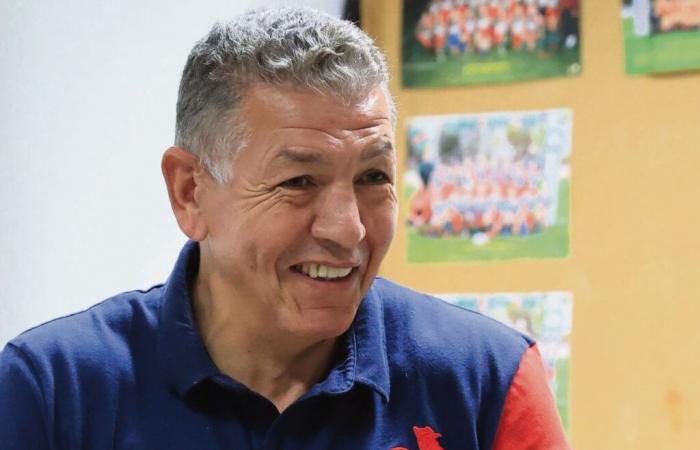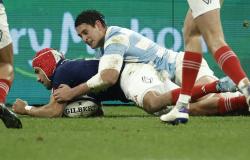
In eleven days, World Rugby, the world body which governs the oval ball, will have a new president. At 72 years old, Bill Beaumont cannot run again, the number of mandates being limited to two. So, who to succeed the Englishman? Three candidates will be opposed, all former internationals. The Italian Andrea Rinaldo, the Australian Brett Robinson and the French Abdelatif Benazzi, certainly the best known of the trio.
Without the favorite, the Scotsman John Jeffrey, who withdrew from the race in September due to differences with his own federation, the former third row of the Blues (1990-2001), aged 56, has real chances of winning. He denounces the current model of governance of World Rugby, opposes the twenty-minute red card project and happily observes the return of Antoine Dupont in the jersey of the national XV.
The JDD. What do you denounce in the current governance of World Rugby?
Abdelatif Benazzi. There is conservatism. The eleven major rugby countries hold 75% of the votes. Everything is tied up and this can harm global development. Emerging nations like Spain, Georgia, Romania, Uruguay, Canada and the United States have been left by the wayside. Unconsciously, the great nations undoubtedly feared losing their power. Whereas today, they are in financial pain! Most of these nations have an operating deficit of around ten million euros. We must review this model, open up more and invest in new regions so that rugby becomes global. We will then reap the fruits. But you have to take that risk. Because by remaining like this, great nations risk disappearing.
So that’s why you declared yourself a candidate at the end of the summer?
The rest after this ad
It was urgent that I take the bull by the horns, with the help of my federation. My supporters believe in the French model, in our economic potential and in what we can bring to rugby.
How do you plan to make the difference compared to the other two candidates?
I respect the values and heritage of World Rugby but, once again, we absolutely must open up democratically and give voices to other nations so that they can influence decisions. It is always the same countries that participate in the World Cup. I no longer want it to always be the same nations that give 100 points to certain teams. I want real competitiveness. My opponents are in continuity because they have been on the World Rugby executive committee for eight years. With them, this type of conservatism will continue. I am for evolution, and certain large Anglo-Saxon nations agree because they are aware of the emergency.
Is your dual Franco-Moroccan culture an advantage insofar as it allows you to say: “I have a more global vision” ?
If it helps, so much the better. I come from a country which does not have a rugby tradition and I was pushed towards the high level. France opened the door for me. [Né à Oujda, Abdelatif Benazzi a fait ses premières armes sur sa terre natale avant d’exploser dans le championnat de France à Agen, NDLR.] I then played in England [aux Saracens]. Understanding different cultures is very important. We must offer rugby adapted to each region. We can, for example, develop rugby sevens in Asia and Africa. If we don’t build a real strategy by riding on the success of the Olympic Games, it’s because we don’t understand anything! Each country is affiliated with an Olympic committee. Every young person wants to represent their country. Rugby sevens can provide this answer. Talking to each federation with its own culture is essential. I will be the president of all regions and all federations.
A new rule is defended by the outgoing World Rugby team: the 20-minute red card. That is to say, after twenty minutes, the expelled player would be replaced by a teammate. Why are you opposed to it?
If I am elected president, there will no longer be these kinds of decisions made by a few historically influential countries like New Zealand. This 20-minute red card was offered after the final of the last World Cup against South Africa. The New Zealanders lost it at fourteen [Sam Cane, le capitaine des All Blacks, avait été expulsé en première mi-temps]. But every rule change must first be discussed by many commissions and shared by many nations. The French federation, in collaboration with the National Rugby League, presented statistics over four years. It turns out that playing with fourteen players does not mean systematic defeat. 40% of numerically inferior matches are even won! The red card must be final. Otherwise, devaluing the red card can lead to more violent rugby. This absolutely must be banned. If the decision passes, we will have to learn our lesson.
The autumn tour will begin with France which will host Japan next Saturday. Antoine Dupont, back in XV after his golden Olympic parenthesis with number 7, will he be able to play all the matches?
I’m not a coach, but I think he has completely understood in his head that he has to come back. It’s been more than a year since he was with the French team, and you saw his stunning return with Toulouse: his performances speak for him. I think he can’t wait to resume his leadership of the French XV and succeed in this challenge of winning this series of three matches in Paris.
“Devaluing the red card will lead to more violent play”
How do you judge this French team?
After the World Cup last year, a new cycle began. The federation has concluded a new agreement with the League allowing it to have many players available to prepare for international matches. I believe that Fabien [Galthié, le sélectionneur] and his team are completely invested. We first want to talk rugby after all the business of the summer. I was in Marcoussis on Sunday [dernier] : the players are impatient to get together, to move on and, above all, to show their level.
Morocco





